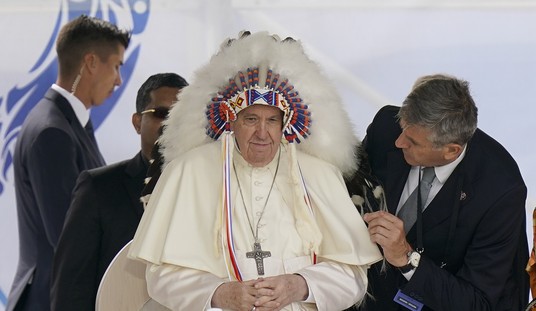Last week, Russia reached an accord with Ukraine and the West to de-escalate tensions in the eastern part of the former Soviet republic that agreed to disarm the militias and end the occupation of government buildings. Ukraine followed up by suspending its “anti-terror” operations and declaring an Easter truce. Both ended up collapsing late yesterday, as a shootout at a “pro-Russian” checkpoint left three dead, and Russia declaring that Ukraine cannot keep order:
Just hours after Ukraine’s government declared an Easter truce, a gunfight erupted early Sunday, leaving three people dead at a checkpoint manned by a pro-Russia militia outside this restive city in eastern Ukraine.
It was the worst violence since diplomats from the United States, the European Union, Russia and Ukraine signed an agreement last week in Genevathat sought to de-escalate tension in the region.
The Russian Foreign Ministry quickly seized on the Easter Sunday clash as evidence that the new Ukrainian government could not keep order.
The new mayor of Slovyansk, meanwhile, begged Russian President Vladimir Putin to send “peacekeepers” to protect the people.
Ukraine’s leaders fear that Putin is looking for any excuse to take more direct action in the nation’s east, where many residents speak Russian and distrust the central authorities in Kiev. The Security Service of Ukraine called Sunday’s attack a “cynical provocation” staged by pro-Russia elements.
If so, it’s one in a series of such provocations, and all to the same end. It’s no accident that Russia accused Ukraine of being unable to keep order. That will be the context of their eventual intervention in that region — to protect the Russian-speaking populations in the Donetsk and other eastern regions, and potentially all the way across to the Transnistria region of Moldova. Just as in Crimea, they need the pretext to mature, while attempting to maintain deniability until it becomes more politically advantageous to take credit for it.
Russia’s ambassador to the US, Sergey Kislyak, tried to offer the same kind of double-talk to Fox News Sunday‘s Chris Wallace. The interview was a little tense already, but when Kislyak accused the US of reviving Cold War tactics, Wallace couldn’t believe what he was hearing:
http://www.youtube.com/watch?v=a24tZbUxx34
Kislyak also denounced western-imposed sanctions that are beginning to leaden the Russian economy. “We do not believe that the language of sanctions is a good one to talk in the twentieth century,” he said. “You cannot work with Russia and try to achieve anything with us through the language of sanctions. Third, the sanctions that have been introduced certainly a significant gesture of the revival of the Cold War mentality. But, it’s Russia. It’s a very solid state, well-to-do country. We can withstand pressure.”
Wallace was flabbergasted that Kislyak accused the U.S. of reviving Cold War tactics, and asked if the entirety of Russian action in Crimea was evidence of the same.
“Oh no,” Kislyak said. “You are talking about Crimea like it is a piece of real estate that we annexed. It’s not. There are 2.2 million people living there. The future of Crimea was decided by Crimeans themselves.”
“Under the thumb of pro-Russian separatists and Russian troops!” Wallace objected. “How far is President Putin prepared to go?”
“We are not going anywhere,” Kislyak said. “We just want Ukrainians to find a way of dialogue, a new constitution, that would help them live in a country that is democratic, that supports the rights of all the ethnic groups, including certain Russians. And we want to have a friendly neighbor. Because for us all, irrespective of what is happening, Ukrainians are just our brothers.”
Kislyak’s contention that Russia could withstand more sanctions will likely get tested. The call to increase US sanctions on Russia took a bipartisan turn yesterday:
As the violence continues, the U.S. President Barack Obama’s administration is facing growing pressure to impose broader economic sanctions on Russia. Two members of the Senate Foreign Relations Committee urged the imposition of sanctions on Russia’s banking and energy sectors yesterday.
“I think the time is now to rapidly ratchet up our sanctions, whether it’s on Russian petrochemical companies or on Russian banks,” said Democratic Senator Chris Murphy of Connecticut, on “Meet the Press.”
Senator Bob Corker of Tennessee, the top-ranking Republican on the committee, said on the same program yesterday the administration should impose sanctions on Russia’s energy and banking industries unless there’s an immediate withdrawal of Russian troops from the Ukraine border.
“Our foreign policy is always a day late and a dollar short because we’re reacting,” Corker said.
The fact that Putin hasn’t ordered the troops across the border yet suggests that the sanctions have his attention — and perhaps the move to station NATO troops in Poland and Estonia, too. But Corker is correct about the need to start shaping events rather than react to them. A big push on sanctions could force Putin to back down and give Ukraine some breathing space for its elections next month. If the West starts hitting the Russian economy broadly, then Putin’s support will narrow quickly — and perhaps a few more lives will be saved in the process.








Join the conversation as a VIP Member